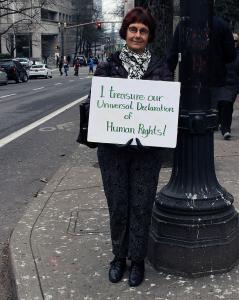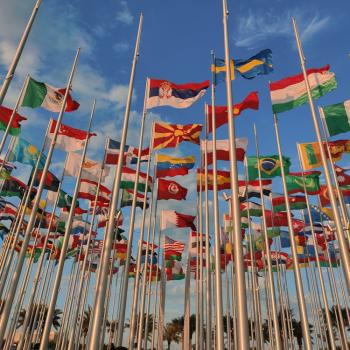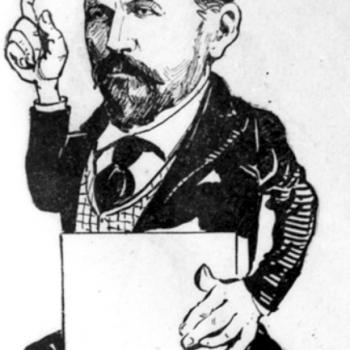
The state should protect the common good, and with it, human rights, including the rights of those who are not citizens of the state. Human rights are universal, meaning, they transcend borders. This was, in part, one of the ideas which the founders of the United States employed to justify their independence from Great Britain; they believed that their rights had be violated, and to protect them, they had to cut ties from England. While it is good to see the notion of human rights beginning to be established at the foundation of the United States, sadly, many of those who talked about such rights ignored them when it came to others, such as slaves or Native Americans. They believed in universal rights, but they believed they were not given to everyone; that is, those who have them, have them without restriction, while those who do not, can be restricted in all kinds of ways. This continues to be an ideological position many hold today. They think they have rights which cannot be rejected, but they can and do reject the rights of others. We can see this in the way some talk about the right to own and use arms, a right which many find questionable; they think nothing can and should stop them from owning guns or their right to use it if they ever believe they need to (even if the need is not there), while they are among the first to deny the rights of people to migrate and seek a place of refuge for themselves and their families. This is why it is important, when talking about rights, it must be made clear not only what those rights are, but who has them. We cannot assume that everyone believes rights are universal, applicable to everyone, even if they say words which suggest they believe in universal human rights, because they often can and do find ways to undermine those rights for others, like the Founding Fathers of the United States did when they upheld slavery or thought many rights, like the right to vote, was related to the possession of property and not human dignity.
While the question of how those rights are made known, and even, the question of what makes something a right, is not to be ignored, we must not assume that if people agree on the source(s) for human rights, they agree on what those rights are, or even for whom they apply. White Supremacists can and often do say rights are God-given, but they will say that God has made them superior, so they alone possess all rights, and everyone else has less or no rights, depending up various qualifications (such as the purity of their racial makeup). Atheists, on the other hand, can have a logical rational which they use to explain why people should be given rights, and in all practical purposes, promote the common good, making them morally superior to White Supremacists who believe God made them superior and to be in control. This is why, in civil society, the question of the source of human rights, while important, often can get in the way of promoting human rights. Christians, dealing with the question, should not assume atheists will lead to their dissolution even as they should not assume belief in God will lead to the promotion of the dignity of all human persons and the rights that dignity should entail.
We should not get sidetracked and stuck in and with philosophical and theological questions when practical concerns are at stake. Jesus, in his parable of the Good Samaritan, as well as in his presentation of the Last Judgment, demonstrated this point: in both situations, what is important is not the religious faith of the person, but the deeds they do. The Good Samaritan represented how we should be in the world, and, to Jesus’ audience, it would have been understood that though the Samaritan was fundamentally wrong in his beliefs, he was shown to be in the right in his actions, demonstrating such beliefs are not necessary for someone to follow the basic principles God wants us to engage. With the Last Judgment, it was not one’s religious adherence, but what one does, which will be judged, and those who live a life of charity will be shown to be working with and for Jesus, even if they did not know it.
Christians need to work with all those who promote human dignity and use that to understand universal rights, and contend against those who would limit those rights and abuse them, turning them to be a thing accorded to a privileged few (like seen coming from White Supremacy), especially if those few believe among those rights are their own domination and power over everyone else (i.e., some sort of manifest destiny). Christians need to make sure everyone, including non-Christians, including people who are not citizens of the country they find themselves in, are shown basic human dignity so that their rights are not violated. Sadly, with the rise of a new Christian Nationalism, Christians often are the ones who stand in the way of the realization of those rights.
Marsilio Ficino, in talking about laws, can also be used to represent the ways in which rights are understood and preserved:
Human laws are accepted from the outset or, once accepted, are kept in being in these ways only: through arguments from common custom based on human and natural principles; through some dictatorial authority or the force of arms; or through ease and convenience of living and the allurements of pleasure. [1]
Christians should understand that non-Christians can and will often accept all kinds of natural principles (philosophical reasonings) to support human rights and their promotion. Of course, like with many Christians, many non-Christians will promote human rights for selfish reasons, seeing that their own personal welfare is protected by the acceptance of such rights, and so will give them to others so that they can have them as well. Sadly, it seems many Christians have abandoned natural principles and instead come to promote the notion that might makes right, and this can be used as one explanation for the rise of Christian Nationalism, as they are being told their might has been given to them by God, and it gives them the right to enforce their ideologies, and anyone who stands in their way, can be and should be seen as so dangerous, whatever human rights they might have had, are to be ignored.
Vatican II should have helped pave the way for Catholics to look for and take practical concerns seriously, instead of circling back to some apologetical point for Christian integralism (and therefore, Christian Nationalism). Catholics, indeed, Christians can and should recognize they have disagreements with non-Christians on various fundamentals, but they can and will agree on other fundamentals, allowing them to promote the common good together. Christians should not even be afraid of atheists who do not believe that rights are God-given because atheists can and still will follow the basic principles which Christians believe should be used to determine them and their applicability (principles which Christian can believe are instilled in each and every person, believer or non-believer alike, which is why they can and will come to have such agreements):
While rejecting atheism, root and branch, the Church sincerely professes that all men, believers and unbelievers alike, ought to work for the rightful betterment of this world in which all alike live; such an ideal cannot be realized, however, apart from sincere and prudent dialogue. Hence the Church protests against the distinction which some state authorities make between believers and unbelievers, with prejudice to the fundamental rights of the human person. The Church calls for the active liberty of believers to build up in this world God’s temple too. She courteously invites atheists to examine the Gospel of Christ with an open mind.[2]
Vatican II gives examples of the rights which people, from different backgrounds, and religious faiths have come to accept:
At the same time, however, there is a growing awareness of the exalted dignity proper to the human person, since he stands above all things, and his rights and duties are universal and inviolable. Therefore, there must be made available to all men everything necessary for leading a life truly human, such as food, clothing, and shelter; the right to choose a state of life freely and to found a family, the right to education, to employment, to a good reputation, to respect, to appropriate information, to activity in accord with the upright norm of one’s own conscience, to protection of privacy and rightful freedom even in matters religious.[3]
Many of these rights are being routinely being denied by nationalists, Christian or otherwise, in the United States to those who are not citizens of the United States. Once the rights are denied, then even helping migrants can become illegal, which is what we see happening in various states, like Texas, where Christian charities are being sued because they are giving basic necessities to migrants. Sadly, it is often those who proclaim themselves Christian, if not also a Christian Nationalists, who are undermining basic human rights, all the while proclaiming human rights are given by God, leading to the question if they actually think those they deny such rights to are actually human (and, to be clear, this is not a made-up concern, as history shows many Christians have questioned the humanity of various other humans).
Human rights are important. Human dignity is important. Human rights flow from human dignity. Secular society can and will promote human dignity, but it will not require everyone to agree as to the source and foundation of that dignity. It is more important to work with that dignity and promote it than it is to theorize on it, even as, Jesus said in the parable of the Last Judgment, it is those who did the work of love whom God knows, not those who claimed to follow God in thoughts and words by acted against the principles of love. Christian tradition has long recognized that human rights are indeed God-given, but it has also recognized non-Christians will also accept those rights, in various way, but especially in the way God has formed the conscience in every human person, so that they can and do have a good foundation they use to promote universal human rights. What is important for society is not the epistemological, ontological, or theological grounds for human rights, but results. Those who act out of love and promote human dignity, no matter their background, should work together, even as those who undermine such dignity should be resisted, no matter their religious faith. For, as Walter Kasper has said, those who work for the good of each other will come in solidarity, promoting justice in the world, a justice which expects everyone to respect each other:
Freedom that is conscious of its own dignity will always respect the freedom of others. It will be in solidarity with their freedom, and will stand up for it. Freedom, therefore, is not “freedom from others,” but “freedom with and for” others. Freedom is realized in justice, which gives everyone his or her due. Freedom concretely presupposes that everyone else will respect their own freedom. It presupposes thereby a system of justice, that is, at the same time, a regulated system of freedom. [4]
This is exactly what the promotion of human rights and dignity entails: freedom, true freedom for all, not just for some, as exemplified by the work for justice in the world, a justice which cannot be established if people are trying to find ways to fight each other instead of unite and work together for the common good.
[1] Marsilio Ficino, The Letters of Marsilio Ficino. Volume 4 (Liber v). trans. by members of the Language Department of the School of Economic Science, London (London: Shepheard-Walwyn, 1988), 3 [Letter 1: To His Friends].
[2] Guadium et spes. Vatican translation. ¶20.
[3] Guadium et spes, ¶26.
[4] Walter Kasper, Mercy. Trans. William Madges (New York: Paulist Press, 2013), 200-1.
Stay in touch! Like A Little Bit of Nothing on Facebook.
If you liked what you read, please consider sharing it with your friends and family!
N.B.: While I read comments to moderate them, I rarely respond to them. If I don’t respond to your comment directly, don’t assume I am unthankful for it. I appreciate it. But I want readers to feel free to ask questions, and hopefully, dialogue with each other. I have shared what I wanted to say, though some responses will get a brief reply by me, or, if I find it interesting and something I can engage fully, as the foundation for another post. I have had many posts inspired or improved upon thanks to my readers.













